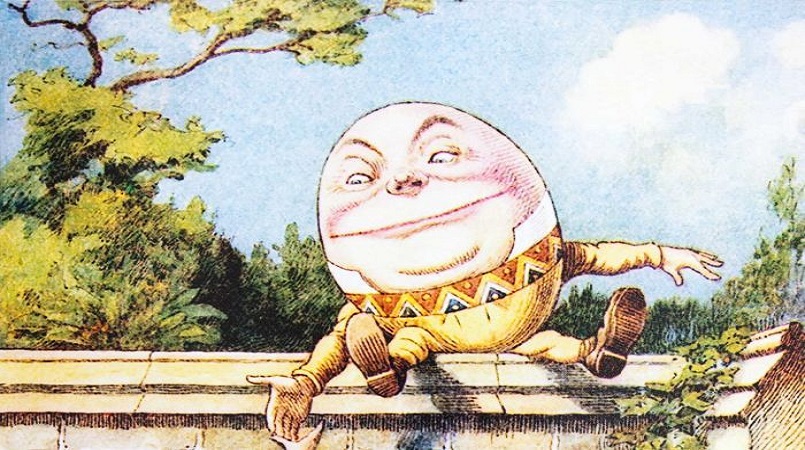
Ring a Ring o Rosie isn't about the plague, Mary Mary Quite Contrary isn't about Queen Mary and Humpty Dumpty wasn't a cannon used during the English Civil War.
Despite the proliferation of explanations for the meanings and origins of nursery rhymes, many, if not most, are unfounded.
Ring a Ring o Rosie, we all fall dead?
Since the 1960s, but not before, it has often been said that the nursery rhyme Ring a Ring o Rosie is about the bubonic plague in England.
Ring-a-ring o' roses,
A pocket full of posies,
A-tishoo! A-tishoo!
We all fall down.
The explanation goes that the roses refer to a rosy rash, which is said to be a symptom of the plague; that children would hold a posy of herbs to ward off the plague or its smell; and that sneezing is a reference to plague symptoms. "We all fall down" obviously points to ultimate death if the plague is contracted.
But these symptoms are mild compared to actual onset of the plague, which doesn't involve a rosy rash. Furthermore, there are many versions of the rhyme, some of which don't refer to sneezing. "All fall down" probably just refers to the children's curtsy at the end of a game.
The nursery rhyme was first written down in Kate Greenaway's 1881 edition of Mother Goose. At that time, ideas about its origins pointed to pagan beginnings.
Similar singing games in the German (Ringel, Ringel, Rosen), Dutch (Roze, Roze, Meie) and Italian (Gira, Gira Rosa) seem to support that hypothesis.
Humpty Dumpty, history lesson or riddle?
A number of different explanations have been put forward about the meaning of Humpty Dumpty. The most popular is that Humpty Dumpty was the name of a cannon used during the English Civil War by Royalists at St Mary-at-the-Wall, Colchester in 1648.
The story goes that this cannon was on top of the wall when the wall was damaged by fire from a parliamentary cannon. Humpty Dumpty fell down ... and couldn't be put back together again.
It's nice to think that this seemingly innocent children's rhyme actually refers to an historical event.
However, once again, there's little solid basis for this theory. The earliest versions don't mention king's horses or king's men, and instead say four-score men and four-score more.
It's more likely that the rhyme is a riddle: the aim is to figure out what exactly "Humpty Dumpty" is. For what it's worth, the first time he was depicted as an egg was in Lewis Carroll's Through the Looking Glass.
London Bridge likely based on fact
It seems the more innocent the rhyme, the bloodier the theory. For example, Mary Mary Quite Contrary is often said to be about the bloody reigns of Queen Mary or Mary, Queen of Scots (two very different people).
Well respected folklorists Iona Opie and Peter Opie, authors of The Oxford Dictionary of Nursery Rhymes, do not give much credence to these theories, comparing them to urban myths.
But the Opies believe that London Bridge is Falling Down may well be based on a bridge that actually crumbled, although there's no specific historical reference.
Interestingly, there are similar examples of this rhyme in other languages, suggesting a universal experience of failed bridges.
Rub a Dub Dub's less respectable origin story
Another rhyme with credible origins is Rub a Dub Dub. One version is dated to around the 1820s and featured "three maids in a tub". We know it now as "three men in a tub", so it's possible that the original version referred men watching women in compromising positions and having a bit too much fun doing it.
By the 1830s, it had been sanitised and the maids had been removed from the rhyme.
The see-saw song's tawdry beginnings
This rhyme is still sung when children are on a playground see-saw.
"See Saw Margery Daw, Jacky shall have a new master; Jacky shall earn but a penny a day, Because he can't work any faster."
Like Rub a Dub Dub, this rhyme has bawdy origins.
Margery Daw is the name for a lazy person, or slut, which originally meant a dirty or slovenly person.
Both versions were probably sung by children playing the game of see-saw. It's also possible that sawyers used to sing these songs as they worked.
Nursery rhymes are often nonsense. Next time you sing one, enjoy it for its simplicity and catchy tune. Don't read too much into it.
